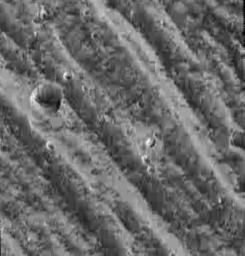
|
Bright and Dark Slopes on Ganymede
- Click the image above for a larger view
- Full-Res JPEG (411 x 431) (25.8 kB)
- Full-Res TIFF (411 x 431) (175.4 kB)
Caption:
Ridges on the edge of Ganymede's north polar cap show bright east-facing slopes and dark west-facing slopes with troughs of darker material below the larger ridges. North is to the top. The bright slopes may be due to grain size differences, differences in composition between the original surface and the underlying material, frost deposition, or illumination effects. The large 2.4 kilometer (1.5 mile) diameter crater in this image shows frost deposits located on the north-facing rim slope, away from the sun. A smaller 675 meter (2200 foot) diameter crater in the center of the image is surrounded by a bright deposit which may be ejecta from the impact. Ejecta deposits such as this are uncommon for small craters on Ganymede. This image measures 18 by 19 kilometers (11 by 12 miles) and has a resolution of 45 meters (148 feet) per pixel. NASA's Galileo spacecraft obtained this image on September 6, 1996 during its second orbit around Jupiter.
Background Info:
The Jet Propulsion Laboratory, Pasadena, CA manages the Galileo mission for NASA's Office of Space Science, Washington, DC. JPL is an operating division of California Institute of Technology (Caltech).
This image and other images and data received from Galileo are posted on the World Wide Web, on the Galileo mission home page at URL http://galileo.jpl.nasa.gov. Background information and educational context for the images can be found at http://www.jpl.nasa.gov/galileo/sepo .
Cataloging Keywords:
| Name | Value | Additional Values |
|---|---|---|
| Target | Ganymede | Jupiter |
| System | Jupiter | |
| Target Type | Satellite | Planet |
| Mission | Galileo | |
| Instrument Host | Galileo Orbiter | |
| Host Type | Orbiter | |
| Instrument | Solid-State Imaging (SSI) | |
| Detector | ||
| Extra Keywords | Crater, Grayscale, Impact | |
| Acquisition Date | ||
| Release Date | 1997-11-18 | |
| Date in Caption | 1996-09-06 | |
| Image Credit | NASA/JPL/Brown University | |
| Source | photojournal.jpl.nasa.gov/catalog/PIA01058 | |
| Identifier | PIA01058 | |
